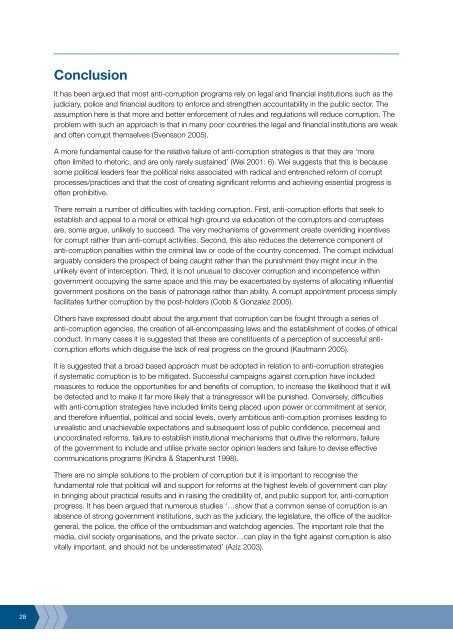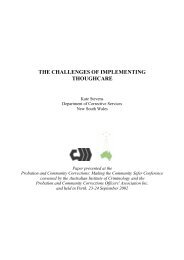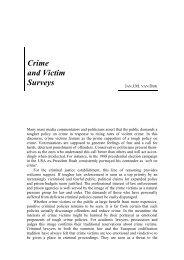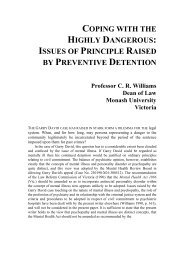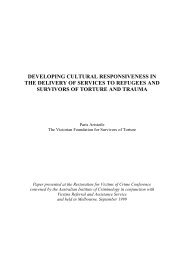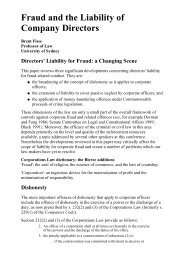Review of anti-corruption strategies Rob McCusker - Australian ...
Review of anti-corruption strategies Rob McCusker - Australian ...
Review of anti-corruption strategies Rob McCusker - Australian ...
Create successful ePaper yourself
Turn your PDF publications into a flip-book with our unique Google optimized e-Paper software.
Conclusion<br />
It has been argued that most <strong>anti</strong>-<strong>corruption</strong> programs rely on legal and financial institutions such as the<br />
judiciary, police and financial auditors to enforce and strengthen accountability in the public sector. The<br />
assumption here is that more and better enforcement <strong>of</strong> rules and regulations will reduce <strong>corruption</strong>. The<br />
problem with such an approach is that in many poor countries the legal and financial institutions are weak<br />
and <strong>of</strong>ten corrupt themselves (Svensson 2005).<br />
A more fundamental cause for the relative failure <strong>of</strong> <strong>anti</strong>-<strong>corruption</strong> <strong>strategies</strong> is that they are ‘more<br />
<strong>of</strong>ten limited to rhetoric, and are only rarely sustained’ (Wei 2001: 6). Wei suggests that this is because<br />
some political leaders fear the political risks associated with radical and entrenched reform <strong>of</strong> corrupt<br />
processes/practices and that the cost <strong>of</strong> creating significant reforms and achieving essential progress is<br />
<strong>of</strong>ten prohibitive.<br />
There remain a number <strong>of</strong> difficulties with tackling <strong>corruption</strong>. First, <strong>anti</strong>-<strong>corruption</strong> efforts that seek to<br />
establish and appeal to a moral or ethical high ground via education <strong>of</strong> the corruptors and corruptees<br />
are, some argue, unlikely to succeed. The very mechanisms <strong>of</strong> government create overriding incentives<br />
for corrupt rather than <strong>anti</strong>-corrupt activities. Second, this also reduces the deterrence component <strong>of</strong><br />
<strong>anti</strong>-<strong>corruption</strong> penalties within the criminal law or code <strong>of</strong> the country concerned. The corrupt individual<br />
arguably considers the prospect <strong>of</strong> being caught rather than the punishment they might incur in the<br />
unlikely event <strong>of</strong> interception. Third, it is not unusual to discover <strong>corruption</strong> and incompetence within<br />
government occupying the same space and this may be exacerbated by systems <strong>of</strong> allocating influential<br />
government positions on the basis <strong>of</strong> patronage rather than ability. A corrupt appointment process simply<br />
facilitates further <strong>corruption</strong> by the post-holders (Cobb & Gonzalez 2005).<br />
Others have expressed doubt about the argument that <strong>corruption</strong> can be fought through a series <strong>of</strong><br />
<strong>anti</strong>-<strong>corruption</strong> agencies, the creation <strong>of</strong> all-encompassing laws and the establishment <strong>of</strong> codes <strong>of</strong> ethical<br />
conduct. In many cases it is suggested that these are constituents <strong>of</strong> a perception <strong>of</strong> successful <strong>anti</strong><strong>corruption</strong><br />
efforts which disguise the lack <strong>of</strong> real progress on the ground (Kaufmann 2005).<br />
It is suggested that a broad based approach must be adopted in relation to <strong>anti</strong>-<strong>corruption</strong> <strong>strategies</strong><br />
if systematic <strong>corruption</strong> is to be mitigated. Successful campaigns against <strong>corruption</strong> have included<br />
measures to reduce the opportunities for and benefits <strong>of</strong> <strong>corruption</strong>, to increase the likelihood that it will<br />
be detected and to make it far more likely that a transgressor will be punished. Conversely, difficulties<br />
with <strong>anti</strong>-<strong>corruption</strong> <strong>strategies</strong> have included limits being placed upon power or commitment at senior,<br />
and therefore influential, political and social levels, overly ambitious <strong>anti</strong>-<strong>corruption</strong> promises leading to<br />
unrealistic and unachievable expectations and subsequent loss <strong>of</strong> public confidence, piecemeal and<br />
uncoordinated reforms, failure to establish institutional mechanisms that outlive the reformers, failure<br />
<strong>of</strong> the government to include and utilise private sector opinion leaders and failure to devise effective<br />
communications programs (Kindra & Stapenhurst 1998).<br />
There are no simple solutions to the problem <strong>of</strong> <strong>corruption</strong> but it is important to recognise the<br />
fundamental role that political will and support for reforms at the highest levels <strong>of</strong> government can play<br />
in bringing about practical results and in raising the credibility <strong>of</strong>, and public support for, <strong>anti</strong>-<strong>corruption</strong><br />
progress. It has been argued that numerous studies ‘…show that a common sense <strong>of</strong> <strong>corruption</strong> is an<br />
absence <strong>of</strong> strong government institutions, such as the judiciary, the legislature, the <strong>of</strong>fice <strong>of</strong> the auditorgeneral,<br />
the police, the <strong>of</strong>fice <strong>of</strong> the ombudsman and watchdog agencies. The important role that the<br />
media, civil society organisations, and the private sector…can play in the fight against <strong>corruption</strong> is also<br />
vitally important, and should not be underestimated’ (Aziz 2003).


